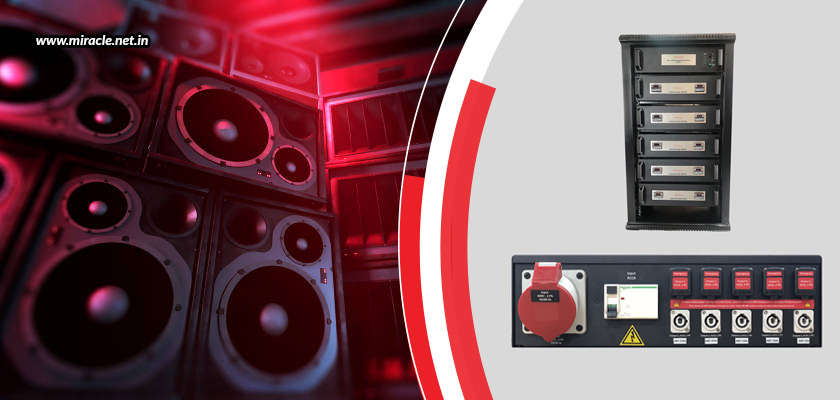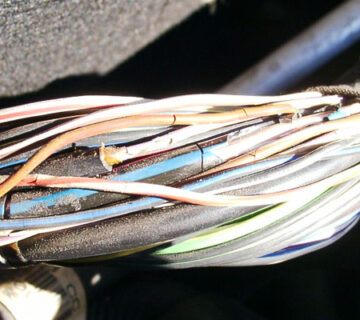Achieving excellent sound quality is crucial when it comes to audio reproduction. To achieve flawless sound reproduction, professionals and audiophiles alike spend a lot of money on equipment and room acoustics. Power quality is one element that is frequently disregarded here; what is forgotten is that power quality has a significant impact on audio quality. Power quality refers to the characteristics of electrical power that enables electrical systems to operate as intended; and it is impossible to overestimate the influence power quality has on audio reproduction. Let’s examine the intricate connection between audio reproduction and power quality, emphasizing the difficulties it presents and strategies to mitigate its negative consequences. Power quality issues, which can range from voltage swings to electrical noise, can cause signal distortion, decreased fidelity, and early device failure. The use of power conditioning devices, appropriate grounding methods, and sturdy circuit designs are essential measures for protecting audio systems from the damaging effects of low power quality, guaranteeing both professionals and beginners an immersive and uncompromised listening experience.
Understanding power quality
Power quality, which includes harmonics, electrical noise, voltage fluctuations, and interruptions, influences audio systems from a variety of sources. Harmonics deteriorate sound quality by introducing undesired frequencies into the stream, while voltage fluctuations produce distortion and loudness variances. During audio playback, electrical noise from common power sources might produce hisses, hums, or clicks. These disruptions greatly affect the integrity and clarity of the audio, whether they originate from the power grid, nearby electrical equipment, or internal components. It’s critical that audio professionals and enthusiasts handle these issues with efficient mitigating solutions, such as isolation transformers, grounding schemes, and power conditioning devices. These equipment can guarantee peak performance and maintain the accuracy of audio reproduction, enhancing the overall listening experience.
Challenges in audio reproduction
Due to their sensitive nature, audio signals are extremely susceptible to even small variations in power quality. Voltage errors can cause signal distortion, which reduces clarity and fidelity. Harmonic distortions can alter the tone of an instrument or voice, which reduces the realism of the sound representation. Electrical noise can also mask finer details in music, which detracts from the overall listening experience. These issues are particularly noticeable in high-fidelity audio setups, where discerning listeners place a premium on flawless sound. Strong mitigation procedures, such as power conditioning devices and grounding techniques, are necessary to overcome these issues. Professionals and audio enthusiasts alike may maintain the integrity of their setups and satisfy even the most discerning listeners by proactively managing power quality.
Effects of poor power quality
Poor power quality presents serious hazards to audio equipment and audio playback. Speakers, digital converters, amplifiers, and other fragile components can sustain damage from voltage spikes or surges. Extended exposure to voltage variations or harmonic distortions can accelerate deterioration and lead to early equipment failure. Electrical noise also has the ability to cause undesired artifacts in the audio stream by interfering with the audio circuits’ regular functioning. These negative consequences highlight how crucial it is to maintain high-quality power supply in audio systems. Strong protection mechanisms like voltage regulators, noise filters, and surge suppressors can be used to reduce these hazards and protect audio equipment, while maintaining the accuracy of sound reproduction. In order to maintain the lifespan and functionality of audio systems and reduce the possibility of expensive repairs and downtime, proactive monitoring of power quality is thus absolutely crucial.
Mitigating power quality issues
Power quality issues require an all-encompassing approach that includes hardware and system design elements. High-quality power conditioning devices, such as surge protectors and voltage regulators, stabilize voltage levels and dampen brief disruptions. Electrical noise is reduced and ground loop problems are mitigated using isolation transformers and balanced power supply. Signal integrity is preserved by successfully minimizing electromagnetic interference through the use of appropriate grounding and shielding procedures. Furthermore, strong circuit designs and high-quality components strengthen audio systems’ resistance to power-related aberrations. Professionals and audio enthusiasts may minimize the negative impacts of power quality disruptions and maximize the performance of their audio settings for an unmatched listening experience by using these techniques to maintain a clean and steady power supply.
To conclude, power quality is the most important factor to consider when aspiring to achieve audiophile-grade sound reproduction. Electrical noise, harmonics, and voltage variations all have a substantial influence on audio fidelity, which highlights the need for proactive prevention. Investing in power conditioning equipment, putting good grounding procedures into practice, and adopting resilient system designs are thus essential steps in mitigating the negative consequences of low power quality. Miracle Electronics is a prominent audio power conditioner manufacturer in India that is distinguished by an unwavering dedication to quality, with products that deliver perfect sound reproduction and reliable performance. After all, in order to fully realize the potential of audio systems and provide an immersive listening experience with unmatched clarity, depth, and authenticity, a clean and dependable power supply is utmost important.




